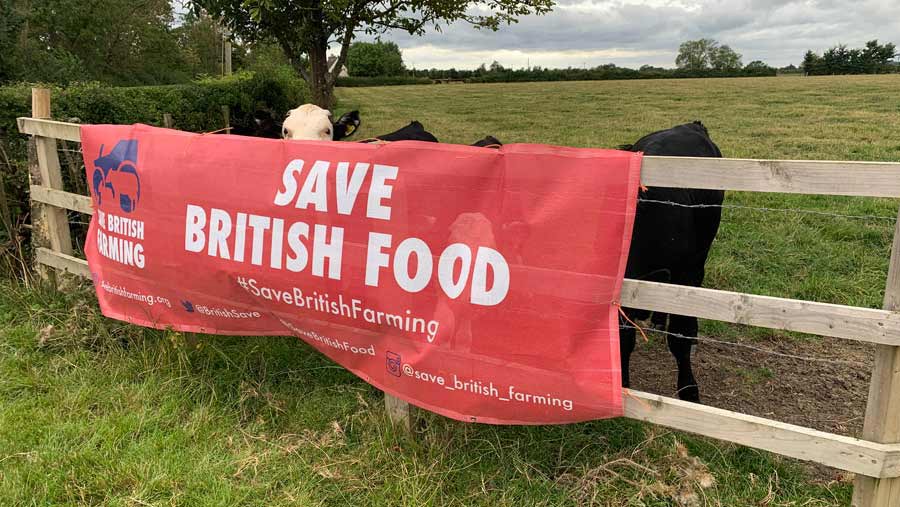Farm lobby urges support for trade agreements bill
 © Save British Food
© Save British Food The farm lobby group Save British Farming has announced a name change and will now be called Save British Food – as it focuses on efforts to secure a future for domestic food production and trade deals that do not damage farmers’ livelihoods.
As well as the rebranding, the group launched its vision of a food plan for Britain (see panel), which lists a series of proposed actions for government to secure the future of the food and farming industries.
MPs will join farmers at Parliament Square in London today (Tuesday 15 March) to hold a rally to publicise the new food plan and urge support for a new Trade Agreements (Parliamentary Scrutiny and Farming) Bill.
See also: Video: Tractor protesters target Swindon MPs’ offices
Save British Food argues that the UK government has signed two trade deals – with Australia and New Zealand – which threaten British food security and says parliament is being blocked from scrutinising and voting on any trade deals negotiated.
The group wants MPs to support the private member’s bill, tabled by former Liberal Democrat leader Tim Farron, which has its second reading in parliament on Friday 18 March.
If the bill is passed, it would require the government’s Trade and Agriculture Commission to assess the impact of any new trade deal on UK farmers and the food industry and guarantee that MPs have the final say on trade deals negotiated by the government.
It would provide a guarantee that MPs can act as a final safeguard on future trade agreements and ensure that the impact of any trade deal on food security, farmers and food producers is properly assessed and scrutinised. This would include an assessment of the impact of new trade deals on farming communities in each region and nation of the UK.
Farmers ‘threatened’
Speaking ahead of the rally, Mr Farron, the Lib Dem MP for Westmorland and Lonsdale, said: “Never has Britain needed its farmers more than at this present moment. But never have British farmers faced more threats from their own government than they do now.
“Whether it’s botching the transition to a new farming payments system or celebrating badly negotiated trade deals, the government is taking farmers for granted. It’s time for politicians and the people we represent to stand up to government and to show that we back British farmers.”
Shadow Defra secretary Daniel Zeichner accused the Conservative government of rushing into trade deals which undercut the UK’s high standards of food production.
“Labour’s pledge to make, buy and sell more in Britain means more food grown in this country, to good quality – not an influx of lower-standard food imports,” he said. “Our next manifesto will provide as much hope and opportunity to rural communities as it does to those living in towns and cities.”
G7 meeting
On Friday 11 March, Defra secretary George Eustice held a virtual meeting with farm leaders from the G7 nations to discuss the impact of the Ukraine war on food and farming.
Defra has played down concerns of food shortages due to the conflict. It said the government did not expect any significant direct impact on food supply as the UK imports very low amounts of foodstuffs from eastern Europe.
“Our thoughts remain with those affected by the terrible events in Ukraine,” Mr Eustice said after the meeting. “We will work with global partners to ensure a resilient global food supply, and support Ukrainian farmers.”
New plan urges government to focus on domestic food production
Save British Food has launched a new food plan for Britain which urges the government to prioritise food production in this country.
The report, A National Food Production Strategy: The missing link in post-Brexit policy, was written by renowned agricultural economist Sean Rickard.
“It is time the government gave priority to food production in this country. Recent events have only reinforced this urgent need,” Dr Rickard said.
The 10-page report outlines an alternative approach to post-Brexit agricultural policy based on a food production strategy.
The study argues there is a “deafening silence” in the Agricultural Act 2020 about what farmers and food producers should do to increase resilience and international competitiveness.
It urges the government to publish a food production strategy aligned with EU agri-food standards, and prioritise the industry’s productive potential by focusing on technologies to improve productivity and support for universities, research institutes and innovation clusters.
